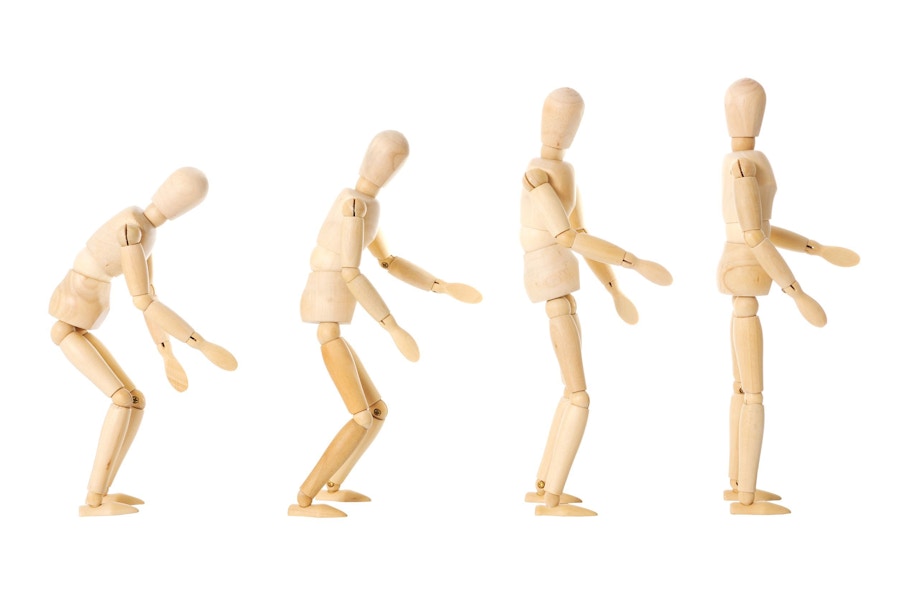After experiencing its crippling effects, Esther Gokhale began her lifelong crusade to vanquish the modern epidemic of back pain.
She began studying primitive people groups, ones where back pain was almost entirely absent, even in elderly people whose lives had been spent in intensive physical labor. A pattern emerged in the way these people naturally walk, stand, sit and bend over. The posture handed down for generations and unhampered by modern habits naturally provided for a strong and pain-free back.
People in the west once had good posture, too, but the 1920s brought major social shifts which changed how we carried our bodies. Slouching became fashionable. Families became dispersed and traditions were lost. Little by little we became a hunched over people.
Anyone with back pain knows that it turns otherwise thoughtless activity — walking, standing, sitting — into gritted-teeth acts of will. The pain makes us contort in ways that provide temporary relief but in the end perpetuate the problem. And while medicine may quiet the pain, it does nothing to address the source of the pain. Posture isn’t the cause and cure of all back pain, but Gokhale’s research revealed it is a factor more often than not.
What does it mean to be upright?
Scripture uses the term upright dozens of times, particularly in the Psalms.
“For the LORD is righteous, He loves righteousness; His countenance beholds the upright.” —Ps. 11:7 NKJV
Upright isn’t uptight. It’s walking in righteousness, not self-righteousness.
Righteousness is a word hijacked by legalism. It means things working as they should. An upright person walks in the wholeness God intended.
The fall broke us and ever since we’ve had hunched-over hearts. Jesus, the Upright, came to heal hearts so we could walk in wholeness, free from the inner inflammation that makes everyday activity painful and enemy-love impossible. In the world we will have trouble, it’s true, but the trouble need not come from within.
While human pain is nothing new, there is growing evidence that in the last 20 years something significant has changed. In modern cultures mental illness, especially depression, is climbing at an unprecedented rate. There seems to be a new weight on our hearts causing our inner posture to be even more hunched over. What’s going on?
Good old days?
Let’s first smash the rose-colored rearview. The “good old days” weren’t that good. But they were slower. There was a time not long ago when an infinite information machine — a.k.a. the smartphone — didn’t weigh upon the pocket and souls of most human beings. Many of life’s built-in opportunities for character and patience — like farming or writing letters — have been obliterated.
Recently I watched my dad, who grew up working on a farm, build a patio on his house. A part of the patio had to be redone due to a miscalculation, and I marveled at his effortless good attitude and work ethic. Farm life gave him a healthy inner-posture which helps him face everyday challenges.
Years ago a coworker was one of the first to get a smartphone. “Now I can use my downtime like riding in the elevator,” he gushed, “for productive things like reading email.” My heart sunk. The natural margins in life — those spaces to think and pray be bored — were already thin; now they are nearly erased.
The weight of unlimited information
Every human invention is blessing and curse, bringing conveniences to the body and challenges to the soul. The Internet is especially weighty. Its wonder is dulled by its ubiquity, but ponder it for a moment: never before has humankind borne the weight of this much information and connectivity.
We are a tap away from anyone we’ve ever known and an answer to nearly any question.
Even when a device is out of hand but within reach, we’re haunted with an ambient sense of interruption — like the feeling of being in a waiting room where our name might be called at any moment.
The Internet is a tool, of course. Like any tool it can be used for great evil and great good. But I’ve noticed something with this tool. It gives us a sense of knowing things we don’t know, of being connected to others without connecting deeply. Unchecked it tends to increase worry and hurry, painful symptoms signaling there is something heavy weighing down our inner posture.
A pain free back, a pain-free heart
In her book, Gokhale lays out a way back to primitive posture: exercises designed to become habits. The book isn’t mainly prescriptive — when in pain do this exercise to feel better. It’s a way of walking, a way of standing, a way to sit and lie down. I’ve seen it work first hand in a dramatic way.
The heart has its exercises, too, but the analogy needs an asterisk. While the will alone might be enough to transform posture in the body, the will is the starting place in the inner life. The will is best used to surrender oneself to God, then it’s God who transforms the heart.
That’s the pattern in Romans 12:1 – 2. Present your bodies as living sacrifices — and even that is by the mercy of God — that you may be transformed by God through the renewal of your mind.
Spiritual exercises — think sitting quietly with Jesus, being with the poor, savoring the 23rd Psalm, receiving prayer from a Christian who thinks differently from you — are a means of presenting our bodies to God. They are a way of working out the salvation God provided for us. God comes alongside us in the workout so that the results far outpace the effort we put in. Gradually, ever more leaning on God, we are made upright — which makes life more enjoyable and serving others less strained.
Practical ideas and a prayer
God eagerly desires to displace our anxiety with peace, distraction with presence, our heaviness with his light burden. He wants us to be upright not because he is a perfectionist, but because He loves to see his children walking and worshipping in freedom.
Some practical ideas:
- Start the first half hour of your day device-free. Instead, try praying out loud, reading a Psalm out loud, or singing. I emphasize these verbal activities because spoken truth is especially effective in rooting us in the reality of God.
- Google with God. Before diving into research or shopping on the Internet, say a short prayer inviting the Holy Spirit to guide you. Your time will be less distracted and more productive.
- Schedule a time to journal with God. Think of a recent occasion when you felt anxious, angry or worried. Write out your thoughts, emotions, and your honest feelings toward God. Maybe you felt like God left you alone. Write out a prayer of repentance — less “I’m sorry” and more “I turn now and agree with You in the truth that You will never leave or forsake me.” Then, write what you imagine God would say back. If you’re concerned about mishearing God, share what you write with a spiritual friend or pastor.
And a prayer:
Father, you alone have infinite knowledge and wisdom. Forgive me for trying to figure things out on my own. When connectedness makes me disconnected from you, help me respond to your gentle voice which invites me back to being present to you. For in your presence is fullness of joy. Heal my inner posture that I may walk upright in the Spirit: unhunched, unhurried, present to my family, and productive in my work. Amen.
Text First Published April 2016


